Community health workers make needed comeback
by Katherine HendrixSpecial to The Catalyst
Community health workers, seen as an unaffordable frill in the cost-cutting 60s, hold the key to what has been the objective all along—efficient health care delivery to the people who need it most.
In Charleston and Georgetown counties, African Americans with diabetes need it most.
MUSC’s REACH 2010 trains and supports local residents as diabetes health advisors. In turn, they deliver information on proper daily care and treatment to African Americans with diabetes in their communities.
 Beverly
Highland, second from left, brings seniors with diabetes together in quilting
circles to share information and support.
Beverly
Highland, second from left, brings seniors with diabetes together in quilting
circles to share information and support.
An acronym for Racial and Ethnic Approaches to Community Health, REACH functions under a grant from the federal Centers for Disease Control and Prevention and headed by College of Nursing professor Carolyn Jenkins, Dr.PH. The program’s five health advisors live, worship and play in the communities where they work, making it easier for them to meet people with diabetes and help them live healthier lives.
The community health advisors also invite individuals, businesses and political leaders to join the REACH coalitions. These groups cultivate local partnerships to help fight the devastating effects of diabetes. The coalitions provide a forum for community members to address their own health issues.
“The idea is to build strong, grassroots groups around diabetes to ensure the disease remains a high community priority far into the future,” Jenkins said. “Our five community health advisors are energetic community activists from a wide range of backgrounds. They see diabetes in African Americans from the ground level, and this gives them a unique perspective on how to improve the health of people with diabetes.”
Here’s a look at who they are and how they view their work...
Beverly Highland
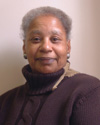 How
were you attracted to becoming a community health advisor?
How
were you attracted to becoming a community health advisor?
“I worked as an Americorps VISTA volunteer for two-and-a-half years
as the parent development coordinator. My job was to recruit parents and
design educational programs to get (them) connected to their kids’ education
and to help their kids set goals. In 1999 I moved to Charleston from Columbia
and started working in the MUSC library because I wanted to work for a
while in a community where I was planning to retire.
Then, when I came, the library had community outreach projects and I was assigned to search the Internet for sites community members could access for information about diabetes.
That started me working with Bobbie Carlson (the REACH librarian). I would go out and help her interview people about their experiences, you know, the problems and successes they were having with diabetes.
That’s how I got in touch with REACH. So I started going to the coalition meetings and I was there when Dr. Jenkins introduced the idea of having community health advisors...”
What needs do you see community health advisors filling that the
health system does not?
“We provide a bridge to the health care system for people who don’t
understand how to access it or who really feel they can’t go to a health
provider if they don’t have money or an insurance card.
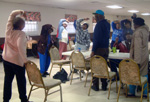 Beverly
Highland, far left, leads an exercise group at rural community center
Beverly
Highland, far left, leads an exercise group at rural community center
We also provide access to resources that are there in the community but everyone doesn’t know about them like non-profit organizations that support medications for people with diabetes. Organizations that lie outside of the regular social service system.
They’re often small, fraternal groups that do smaller scale things. I recently helped a young woman get glasses who has visual problems due to her diabetes from a small service group like that.
The other need we serve is to make the business community aware of needs people have. Right now, I’m working with a local Piggly-Wiggly pharmacy on a project the community asked for.
The pharmacist knew diabetes was a big problem and that people with diabetes needed to avoid certain products and know how to shop. So, she had a walk through (tour of the store) but she did it without support. A local doctor’s office told me to get in touch with them… so I’m going to help them develop that.
There are often people or organizations that have ideas and want to do things to help but they don’t know how to put it together and are struggling to get materials to share. They know about the problem but they need help organizing what to do.”
What do you hope will be the future of community health advisors
in your area?
“That we will be able to develop groups of volunteers to address
specific areas. (People) who understand how to go out and address diabetic
foot care to a novice group—who know how to help someone organize a health
event or how to explain basic information about diabetes.
We want to develop groups in each community who know how to help people address health issues. Eventually, REACH won’t be there and so we need to leave something, a firm tool, in the community that they can always use.”
If the current health system would change one thing what would
you like it to be?
“Get together and provide information. If the health care providers
got together and provided information in whatever format. I think that’s
the biggest problem for people with diabetes.
They don’t have the information they need to act for positive self-management. The health providers need to give the same message whether it’s the regular general practitioner or the ophthalmologist or the podiatrist. Just so they are all giving the same information to each person with diabetes. I think that would do the greatest good.”
Virginia Thomas
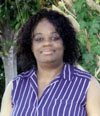 How
were you attracted to becoming a community health advisor?
How
were you attracted to becoming a community health advisor?
“I have always been a community worker. Working with children at the
city of Charleston summer camps, in my church vacation bible school, mentoring,
and through AKA (Alpha Kappa Alpha Sorority).
I was a Pan Hellenic Greek council representative, Ivy Leaf reporter, secretary, vice president, and immediate past president of the North Charleston chapter— Omicron Rho Omega. I always wanted to help people and I always like having something to do in the community.
I’ve always been interested in health. I started in school as a PE (physical education) major and then switched to biology. My nickname with my choir members is ‘doc’ because I’m always discussing health topics.
I initially worked with REACH as a volunteer in charge of AKA partnership program planning. But I wanted to get to more people and a wider audience.
I had gestational diabetes and a family history of diabetes. So, since diabetes was one of the health targets for the AKAs, I just sort of naturally fell into it. Being pre-diabetic makes it personal.”
What needs do you see community health advisors filling that the
health system does not?
“I think it’s time. The time period health providers can offer a patient
is limited and a lot of times communication is lacking. There’s not enough
time to fully explain and discuss what they’re telling that person.
Also (people) are intimidated by the provider and just say what they know the doctor wants to hear rather than what the truth is and what’s really going on.
They often say they’re taking their medication properly when they’re not. Sometimes they just change the medication doses or frequency because I don’t think the importance of not doing that is stressed enough.
(The provider) just says take it this way or that way and the person walks out shaking their head like they understand and they sometimes don’t. I had one person taking three tablets in the morning with one meal instead of the way he was supposed to which was one tablet with each meal.
The community health worker can provide a bridge between the provider and the patient. We can get to the root of the problem and why things are not working properly.
People have a whole lot of things going on and other problems and so they don’t always do anything about their health until something gets to a serious point. By then, the damage is already done.
People don’t realize that diabetes is a problem born out of a lifestyle and once you make modifications to a lifestyle you can lessen the complications.
It’s sometimes hard for someone at a professional level to come down to lay level. We translate things down to the layman’s level and make it understood.”
What do you hope will be the future of community health advisors
in your area?
“We want to train as many people as possible to volunteer and do what
we do to follow-up with people about their health care.
We want to empower them to take control over their health and get the correct, professional answer and ask questions to be sure they understand what they need to know to stay in better health.”
If the current health system would change one thing what would
you like it to be?
“To treat a person as a person and as an individual and to listen to
them more. I go to my doctor’s office and he talks.
They talk to you and sometimes you don’t have the opportunity to unburden yourself.”
Sheila Powell
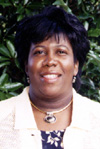 How
were you attracted to becoming a community health advisor?
How
were you attracted to becoming a community health advisor?
“(The community health advisor position for REACH) was brought to my
attention because of my community work.
At that time, I was working primarily with schools on the school governance council and also with the town of Awendaw’s auxiliary board for community improvement and as a member of the board of zoning appeal.
I was recently elected to the constituent school board for District One which serves Awendaw and McClellanville and was also invited to serve on the board of directors for the South Santee Senior Citizens Center.
I work with my church, Mount Nebo AME, too as the director of their health ministry and on several other (church) boards. And I’m the President for the area Friends of Lincoln Alumni Association for Lincoln High School.
I keep saying I’m going to give up one but can’t make up my mind which one I could give up. So, until then, I’m just going to do them all.”
What needs do you see community health advisors filling that the
health system does not?
“Having someone who can go into their homes and wherever they are—
community events or church or what have you. Being accessible to them.
I can get information on diabetes to them right there and then. It’s the quick response and being part of a network to link to others.
I provide a base right here to promote community empowerment by helping people utilize resources that already exist in their community. So they don’t have to go try to find information out from somewhere else.
Also, I think the advantage of being a CHA is that I’m accepted. It’s kind of like I don’t need an introduction. They know me from being a part of the community.
They may just know that I’m Jimmy’s daughter but just that is an automatic invitation in.
They’re at ease and can relate to me. They know I’m looking out for their best interest.”
What do you hope will be the future of community health advisors
in your area?
“Well, it needs to continue and not be a program that has a quick start
and a quick stop. It needs to be long term. You need to keep going even
if it’s through a slow period.
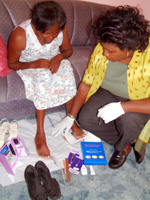 Sheila
Powell visits people with diabetes at their homes to explain proper foot
care one-on-one.
Sheila
Powell visits people with diabetes at their homes to explain proper foot
care one-on-one.
Too many times in the past things come in and are short term. That’s why you get the cold shoulder sometimes because the resistance is ‘Well, if you’re not going to keep it going, why start it?’ REACH may go away but I’m here to stay so we’ll figure out how to keep it going. This is home so I want to ensure we keep enhancing our home.”
If the current health system would change one thing what would
you like it to be?
“There needs to be more education. Too often you come in contact with
people who have diabetes and that’s all they know is that they have diabetes.
Just telling a person to go to a class doesn’t solve the problem. You have to understand the whole person to know what restraints some of them are facing.
There are other restraints that they can’t get there or afford it. How do you expect them to go to a class when they are worried about the light bill or can’t even afford their medication to begin with? That’s part of a governmental problem too.
Another stumbling block in my area is transportation. We need to promote more educational programs here. We don’t have a transit system in the Awendaw/ McClellanville area that goes anytime. You have to go with the HHS/DSS community van early in the morning. Pretty much, if you use it, you have to go with everyone at one time in the early morning and you can’t come home until the late afternoon. It takes the whole day for one doctor visit and you have no choice.
We have to make sure we design ways to help keep people involved with improving their health by providing community assistance.”
Florene Linnen
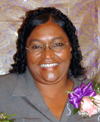 How
were you attracted to becoming a community health advisor?
How
were you attracted to becoming a community health advisor?
“When REACH came along I was already a community health worker. All
my life I have worked with community.
I am a diabetic and some folks from DHEC, Tressa Devlin and Regina Nesmith, invited me to come to a diabetes workshop they were having. What I learned there was more than I’d learned in the whole 16 years since I’d been diagnosed.
I brought the information back to my community and contacted people… and we formed the Georgetown County Diabetes CORE group which stands for Community Outreach Service Resources and Referrals. Primarily, the goal for CORE is educating our local residents about diabetes.
I got home one night and Tressa Devlin called and told me about REACH and that we might have an opportunity to do more. But she said we needed to get 100 letters from people in the community saying we need more diabetes education.
So that’s what we did and we got them all in one day! It was crazy! So, CORE was a grass-roots organization at the time and we were at the table as REACH was forming.”
What needs do you see community health advisors filling that the
health system does not?
“Education. (Health providers) might do education but the way we do
education as community health workers is we start it from the community.
This is what’s so great about REACH. They didn’t sit at a desk and tell us what we need to do. They asked the community people what they wanted.
You can’t come in and tell me what I need if you’ve never been here! So we work from the needs of the community as the local people see them.
I feel like the community health advisors have a closeness with the people. We don’t mind going out into the community because they’re our relatives and our friends, our neighbors, people we see everyday.
So we feel we can do a much better job educating folks than some of the professionals. We talk the same language and can identify and we think in our hearts alike.”
What do you hope will be the future of community health advisors
in your area?
“Even after REACH is gone, my goal and my dream is to get funding for
Diabetes CORE so we can improve the health status in our community.
To any community that’s even thinking of having community health advisors, I would say it would be the best thing that could ever happen to you. Just thinking of getting health advisors from your own community to help yourselves is the right start.
CORE along with REACH is really making a difference in our community. I have great support from many volunteers and that tells me that they want what we’re giving.
I intend to be here ‘til I’m 80 years old working on diabetes education.”
If the current health system would change one thing what would
you like it to be?
“They should do more prevention before the disease really hits the
body. Because, in my community, in the black community, diabetes is very
prevalent and people are dying. I see death and dying and education about
the disease is just not here except for the community health advisors.
The sad thing is you walk into the doctor’s office and the first thing you see is a sign that says ‘No money-No care’. Even worse, sometimes the doctor doesn’t do all they can to teach people to take care of their diabetes.
Also, some doctors don’t always know the latest information about diabetes and where to find resources to help people who have it.
And race is a big factor. If you go to the doctor and you’re of another race, right away they feel like you can’t afford the medication and you can’t understand the information.”
Anna Johnson
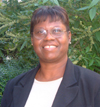 How
were you attracted to becoming a community health advisor?
How
were you attracted to becoming a community health advisor?
“I just wanted to be able to help people in the community and this
was a way I could bring information to them about a serious disease.
I had some community experience before. I had the opportunity to work on a health seminar at a former job with the Department of Transportation. So I realized the importance and value of being able to provide free health screening and information for people who may have a low income.
I thought being a community health advisor with REACH was a great opportunity for me to do something I enjoy and be of service to other people while I do it.
I’m a people person and I just think that’s always going to be my thing. To give you an example, I just saw a man I knew yesterday in the drugstore and we were talking while he was waiting for his prescription. I was concerned because he was a diabetic person and he was telling me how he couldn’t afford all his medications.
I thought, ‘Here’s someone I can help right now.’ He works but has no insurance so I’m helping him apply for a medication card.
I could have gone on by but I just kept on asking him more and more questions. Why was that? It was just because I felt like I should be helping him out!”
What needs do you see community health advisors filling that the
health system does not?
“Well, first of all I think people feel more comfortable with us when
they talk about their health problems. It could be the atmosphere or that
they aren't talking to a ‘white coat’ since that's a little intimidating.
And we're spending more time with the person where they're able to think through the questions they have...
They seem more relaxed to telling us about what's going on. In the doctor's office, they ask you questions and it seems like you can just respond with a yes or no answer and then they move on.”
What do you hope will be the future of community health advisors
in your area?
“I think it would be great to have the community health advisor
resource be continued because a lot of people and groups and organizations
want our services.
They need more experience helping people in the community address their own health problems. We help them gain that experience so they can carry on what we’re doing by themselves. I just hope we’ll be out there long enough that people will become well trained to carry on for themselves.
They didn’t even have any idea about how to address the health problems in their community by themselves when we came in.
Watching what we do has helped them realize the importance of having someone else (beside the doctor) they can go to like a lay person because they don’t have the money all the time to go to the doctor.
The information we have can help them avoid problems.”
If the current health system would change one thing what would
you like it to be?
“Well, I think it would be to spend more time with the patient, where
they can gather up more information from the person.
Talking to the patient- it takes time to warm someone up ‘til they’re comfortable telling you everything that’s really concerning them.
I think they leave out something important a lot of times when they
talk to the doctor because they feel like they’re being rushed.”
Catalyst Online is published weekly, updated as
needed and improved from time to time by the MUSC Office of Public Relations
for the faculty, employees and students of the Medical University of South
Carolina. Catalyst Online editor, Kim Draughn, can be reached at 792-4107
or by email, catalyst@musc.edu. Editorial copy can be submitted to Catalyst
Online and to The Catalyst in print by fax, 792-6723, or by email to petersnd@musc.edu
or catalyst@musc.edu. To place an ad in The Catalyst hardcopy, call Community
Press at 849-1778.